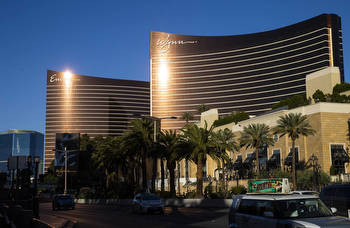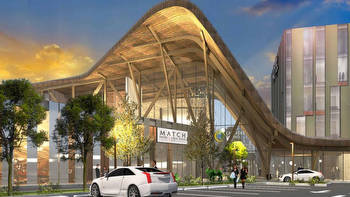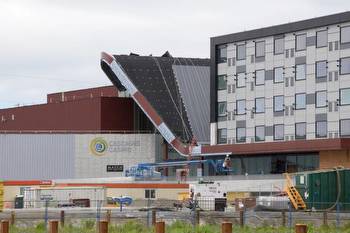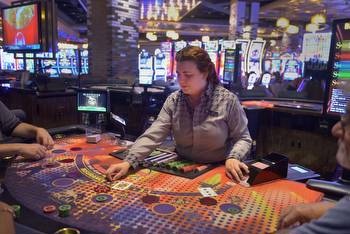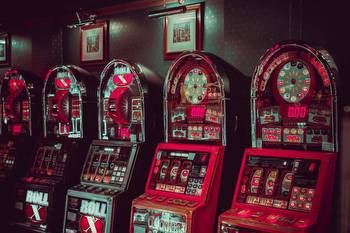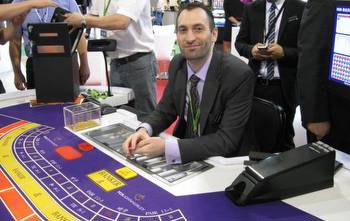What Does a Casino Pit Boss Do?

A casino pit boss has become a bit of a layman’s term for anyone found in a suit or wearing something other than a dealer’s uniform behind the casino’s table games. Its earliest meaning in the 1940s and 1950s was someone who oversaw the myriad box men, floor supervisors, dealers, and often the ancillary people, like cocktail staff and security, involved in running a section of table games commonly referred to as a pit.
In this article, we take a look at the Casino Pit boss and outline exactly what the job involves.
What is a Casino Pit Boss?
Today a pit boss’s job has evolved and sometimes been replaced by technology. When they can still be found, the folks who still run entire pits or some numbers of pits are referred to as pit managers or floor managers. But just like the recessed floor areas or pits that often held table games in days past so that they could be easily viewed and attract the eye of curious gamblers, pit bosses are a dying breed.
While often confused by casual gamblers with the floor people or box men who run small sections of table games or even just one crap table, a proper pit manager job will entail overseeing at least a number of these subordinate supervisors, or in some cases many of them.
While the portrayal of pit bosses in older TV and movies as all-powerful princes of their own table game kingdoms may have had some tiny bit of truth in real life, today’s pit managers are much more bureaucrats than royalty, overseeing casino complementaries, issuance of credit and markers, dealer’s table assignments and breaks, and often handling guest service complaints and lapses.
Other casino supervisory staff
Floor supervisors are a step down the org chart but often also wear business attire instead of dealer uniforms and are thus conflated in the public eye with the pit managers. Other than a quick job description blurb on a name tag, telling them apart can take a lot of work.
But a floor person will generally be assigned to just four or possibly six games and should, in practice, always stay in that designated area. They will take your player’s card, ensure you are rated correctly on the computer, closely monitor the dealer, interact with them, and acknowledge them when they call out cash buy-ins and color-ups.
Craps box people, or even ladder men, are supervisors one more step down the org chart. They watch just one crew of dealers on one assigned table. In the case of a box person, they sit at a craps table and closely monitor the four assigned dealers and their payouts, wagers, and speed of their game. In the case of a ladder man, they do the same but with an assigned Big Baccarat or Chemin De fer game.
Technology is changing the Pit Boss role
Over the last thirty years, many of the functions of a pit boss have become automated. The issuance of comps was once a gut feeling after checking over someone’s play for the day on manual rating cards. Today a computer will dissect that player’s profitability in a dozen different ways to let someone know if that play warrants a free buffet or a night in the hotel.
Issuing markers for players, a type of credit extended by the casino to higher net-worth gamblers, was once a time-consuming job that required phone calls and rustling through logs of payouts and payments. Today most of that is also handled by computers, and markers are typically approved by the floor people in a matter of seconds.
Example: Cameras and automatic detection
Pit bosses were often expected to have years or even decades of casino game protection experience, not only able to count cards but spot a cheat while also chatting up a cocktail waitress, using the mirrors often used as ceilings in the old Las Vegas pits.
These mirrors allowed well-positioned managers to watch dealers from behind or several table games away to ensure they weren’t flashing cards or capping bets. They also often were two-way mirrors with the very first surveillance agents behind them, looking down on the tables as well.
Cameras with 240x zoom and special sensors to detect ultraviolet daub have replaced all of those mirrored ceilings and many of those pit bosses. And now, with the ability to be tied into facial recognition software and AI that looks for cheating patterns and moves, the need for long years of experience and specialized knowledge of casino scams has fallen away.
Other Pit Boss responsibilities
Another crucial function of Pit Bosses that the casual gambler often overlooks is the intricate dance of placing the right dealer on the right table at the right time. If a dice game is blowing out (losing a lot of money quickly), it’s quite likely that the casino will send one or more new dealers to that game.
Contrary to popular belief, the casino isn’t looking to change the luck of the game with these new dealers; they want their fastest, most skilled dealers on that table to ensure that the games are dealt quickly and accurately, knowing that over time their house advantage will bring everything back in line.
And this goes on across the entire casino floor all the time. Dealers are moved, sorted, sent home early as games begin to close, or replaced by new dealers starting a new shift, and sometimes sent to high-action games to ensure that procedures, pace, and proper game protection occur.
Complicating this more is the fact that a casino might have ten or more different types of casino games, and only some dealers will deal every type, let alone deal each type as proficiently as the next. Great dice dealers are very seldom great baccarat dealers, and while everyone on the casino floor should deal blackjack, not all of them will deal it equally well or have the personality to deal with some high rollers.
Knowing what every one of a hundred dealers deal and whether they can be trusted in highly stressful situations to deal with it well is one of those things that neither computers nor even AI have yet to master.
But many casinos, in their rush to eradicate pit bosses, have turned to pencils. A pencil is just the title for someone who moves the dealers about the floor or sends them home as needed. They do a very special subset of the job that pit bosses used to do, but they do it more economically.
Pit Boss positions in the 21 century
Like many middle management positions, the job of pit boss has slowly been turned over to other departments, computers, underlings like floor supervisors, or folks that will do a piece of the job for less.
But in those casinos that still have them, today’s pit managers still play a vital role, almost like a project manager, in tying many different parts and skill sets into one problem-solving solution. They still need to possess a range of knowledge not only about table games but now also about computers, databases, customer service, surveillance solutions, and even human resources and labor law.
The title may have changed, and the needs of the jobs may be different; there are certainly a lot fewer of them, but people who can oversee a busy casino floor and its many-faceted wants and needs are like a ship’s captain. They will always be in demand.











